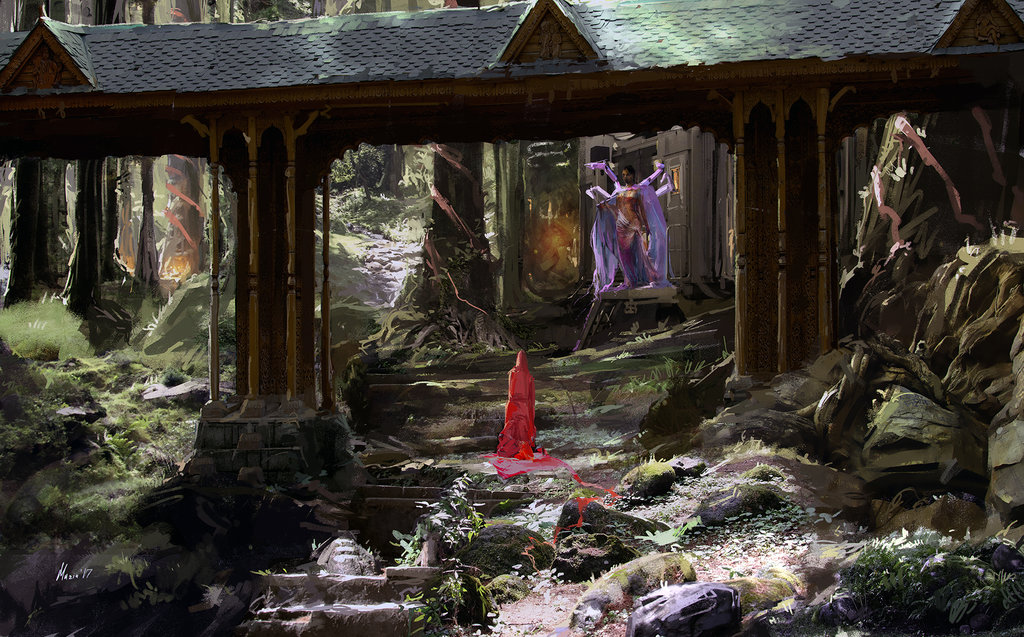Lashunta Ritual Purity - Blood, Water, and Curse
Being a list of things Lashunta consider sacred and profane.
Concepts of Lashunta ritual purity are incredibly common thing in low-tech societies, and frequently survive through religion into more advanced eras. It also creates a lot of opportunity for local variation, as individual customs may differ from city to city and village to village. Note that this becomes part of a larger dialog on social taboos, which I will address as a separate post.
Here is a proposal for some more common ones:
- Lashunta have a strong taboo against shedding blood or bringing fresh blood within the home. While many (but not all) Lashunta eat meat, slaughtering and butchery is reserved for outbuildings or reserved areas, which may be considered profane. This practice stems from the belief that milk-trees will withhold their milk-sap if blood is shed under their boughs, which in cities was further extended to including free-standing houses, even if they don’t include a hometree in their architecture. Note there are many legends about Lashunta who offend their hometree’s spirit by accidentally shedding blood within its precinct, and the trials they must undergo to atone. Consequently, Lashunta will not mix blood with milk in foods, such as puddings.
- Many full-time priests (and some part-time priests, too) will not eat meat to avoid risk of blood pollution. Not that while Lashunta consider fish meat (unlike Catholics), milk, due to its inherent sacredness, is still acceptable for consumption. Meatless fasts are also a common practice even for meat-eaters.
- Murder, aside from the legal consequences (although it may not be a crime if in self-defense or a challenge to combat was properly administered) carries a spiritual blood-filth, which must be properly cleansed and atoned before entering a temple, shrine, or other precinct, possibly with corporeal penance.
- Lashunta collect rainwater that has filtered downward through the leaves of their hometrees. It may be drunken or used for cleaning, especially ritual cleansing. However,, it may never be poured out on the ground, since it is considered blessed by virtue of having passed through the leaves and having absorbed the milk-tree’s essence, and doing so would offend the milk-tree. If excess rainwater must be disposed, it should be poured over the tree’s roots - giving it back to the tree - and only be done by a sanctioned tree-singer invoking the proper hymns.
- Stagnant water, including swamp water, is a desecretor and may not be brought into any temple or shrine. Bringing stagnant water into a house or a hometree will be taken as a flagrant insult, and even as justifiable grounds for violence.
- Similar to rainwater collected in this wise, milk is a consecrating agent. When properly blessed, it may be used to dedicate a building, object, or person for worship. Wasting milk or letting it spoil is a sure source of bad luck. (note: if milk is offered as a libation, it will be cleansed or buried immediately afterward
- Males under a ~kezhi~ - female’s ban-curse - but not banished from the community at large, must await permission to enter a temple, shrine, or even another family’s home-tree. They may be required to undergo a symbolic purification wash before doing so. Note: failure to comply may be grounds for the personal ban-curse to become general.
- Someone under a ~kezhi~ ban-curse extended to the whole city and caught entering a city's gate or within the city's walls will be driven forth with extreme hostility. This is one of the few instance where Lashunta rulers and the populace may carry out a summary death-sentence. Note, since a ~kezhanta~ person is already outlaw, no crime is committed by their murder (though consequential blood purification may be needed).
Primary Related Location
Remove these ads. Join the Worldbuilders Guild



Comments